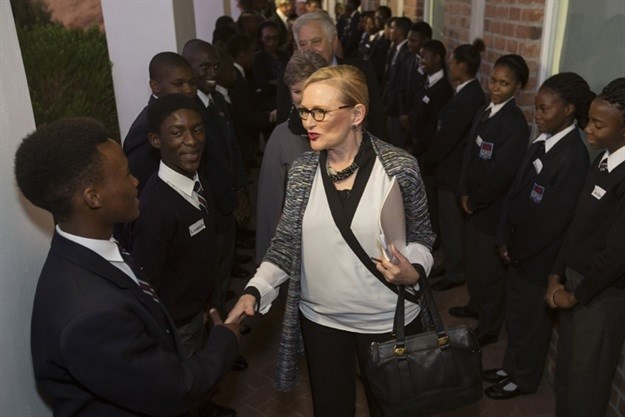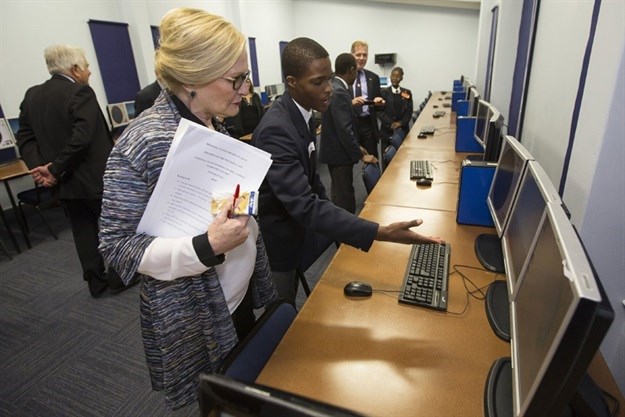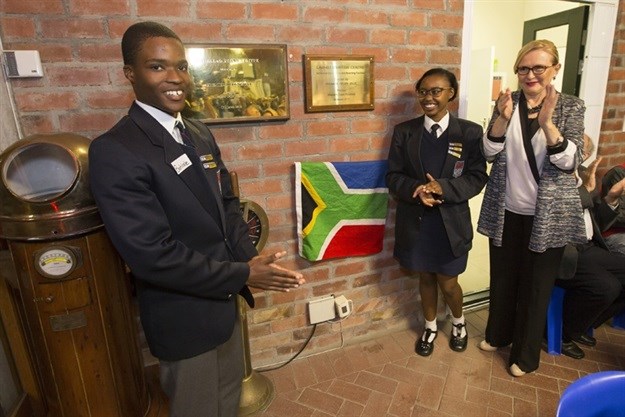Helen Zille, Premier of the Western Cape Province opened additional education and boarding facilities, funded by the TK Foundation, at the Lawhill Maritime Centre in Simon's Town on Tuesday, 28 March 2017.
This includes a world-first electronic navigation classroom for secondary school students, a marine sciences classroom, a ships library and resource centre and additional accommodation.
Twenty-two years ago, Lawhill became the first school in South Africa to offer students a maritime-focused education, while they are still at secondary school. It introduced two subjects, Maritime Economics and Nautical Science in Grades 10 to 12, with the aim of reducing youth unemployment and poverty by preparing young South Africans (particularly those from financially challenged circumstances) for careers in industry. The two maritime subjects form part of the South African curriculum and National Senior Certificate.
Lawhill Head, Debbie Owen says, “Until recently, Nautical Science instruction included training on paper charts and paper radar plots. While there are theoretical modules relating to electronic navigation systems, the school identified the need to provide PC-based simulation training, especially in electronic chart display systems (ECDIS) as the students will encounter ECDIS both in their tertiary navigation studies and at sea.
Captain Kieron Cox of Maretek, who developed the ECDIS system that is currently in use in a number of countries across the world, donated the appropriate simulator software valued at over R1 million. The AP Moller Foundation/Safmarine also donated electronic equipment and the South African Maritime Training Academy (SAMTRA) provides the ECDIS training.
“SAMTRA will be using our new ECDIS facility in our downtime (eg school holidays) to train qualified officers, which will provide an income for Lawhill and support our sustainability, as the school does not receive any direct government funding and relies solely on grants, donations and sponsored student bursaries to fund our operation.”
Developing Marine Sciences curriculum
The Lawhill Maritime Centre has also worked closely with the Two Oceans Aquarium to develop a Marine Sciences curriculum.
“The aquarium is committed to education and has been visited by over 1 million schoolchildren. Over time, the aquarium has been approached by school teachers and district subject advisors to use the content of its courses and to write a Marine Sciences Curriculum and Assessment Policy Statement (CAPS) to form part of the South African FET Gr 10-12 and Matric qualification.”
After consulting widely, the Aquarium decided that introducing a subject into the school curriculum would be a service from which the South African community, particularly students wishing to participate in the Oceans Economy, could benefit enormously.
“After dedicated assistance from the Two Oceans Aquarium staff, the document is now awaiting National Education Department approval and we hope to introduce the subject to Grade 10 students at Lawhill in January 2018,” Owen added.
Maritime history preserved
The new Lawhill facilities also house several important maritime photographic collections that record maritime history of many decades in Cape Town.
“Among these are the collections of Robert Pabst, Karel de Vries, Michael Stuttaford and Unicorn Lines and we are privileged to be the custodians of these unique collections.”
There are also several interesting items donated by the family of the late Captain Dai Davies, one of the country’s most prominent salvage experts, and Rob Young, another prominent figure in the South African shipping industry and marine engineering sector.
“Also in the venue is a plaque in honour of the late Captain Paul Staples whose career included two circumnavigations aboard the original sailing ship Lawhill. During those voyages, Lawhill rounded Cape Horn twice and is one of the most seasoned South African seafarers.”
More student accommodation widens intake
The building of additional cabins has also made it possible for Lawhill to introduce its programme to more young people.
“Our student numbers have increased from 54 to 66 and students at Lawhill come from all over South Africa and Namibia.”
The expansion of the Lawhill facilities is particularly significant when considering the importance of the shipping sector to the South African economy. A few years ago, the South African Government launched Operation Phakisa to focus, amongst others, on job creation in the maritime sector and on ways of extending the number of young people entering worthwhile careers in the sector.
Coupled to this is the stated aim to gain more South African-owned and operated ships and to employ more South African seafarers.
“This important shift of emphasis signals that the Lawhill Maritime Centre can expect a greater demand for its alumni in the shipping sector. Moreover, the more thoroughly we train these young people while they are at school, the greater their chance of obtaining places in tertiary institutions or gaining employment in the maritime sector,” concludes Owen.



































